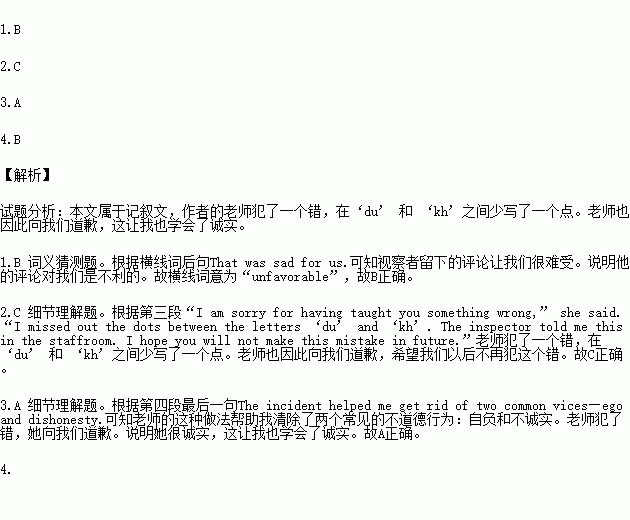题目内容
I was at Kendriya Vidyalaya in Bambolim, Goa, in the 1980s. On Inspection Day one year, an officer and his team from the Board of Education were coming to see how our school was run. As usual, our teachers asked us to be prepared.
At the end of the day, Mrs Sushila Tyaji, our Hindi teacher, walked in and told us that the inspector had come and quietly observed the class from the back door. He had also left an adverse remark! That was sad for us. Would we now be punished for having failed our teachers? There were no answers from Mrs Tyaji. Instead, she wrote the Hindi word “dukh” on the blackboard. And then she did something I have never seen a teacher do in my entire school life. She apologized.
“I am sorry for having taught you something wrong,” she said. “I missed out the dots between the letters ‘du’ and ‘kh’. The inspector told me this in the staffroom. I hope you will not make this mistake in future.”
That admission had a significant effect on me. If our teacher can say sorry to us when she is wrong, why can’t I? The incident helped me get rid of two common vices—ego and dishonesty.
Twenty-three years passed. I had to let my teacher know what that lesson meant to me. I recently located Mrs Sushila Tyaji using the Internet and went to meet her with my husband.
She smiled when she heard my story of how her small decades-old apology had transformed me for good. “It’s tough being a teacher. But every once in a while, when an old student comes along and tells us that we did something right, it makes up for everything else,” she said.
1.The underlined word “adverse” in Paragraph 2 can be replaced by “________”.
A. offensive B. unfavorable
C. encouraging D. unforgettable
2.At the end of Inspection Day, Mrs Tyaji ________.
A. praised the students for their hard work
B. expressed her disappointment in the students
C. told the students that she had made a mistake
D. punished the students for their bad behavior
3.What did the author learn from Mrs Tyaji ?
A. Honesty is the best policy
B. Comfort is better than rude
C. One can never be too careful
D. It is better to be safe than sorry
4.The author’s word during the visit made Mrs Tyaji feel ________.
A. guilty B. contented
C. surprised D. embarrassed

